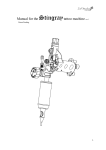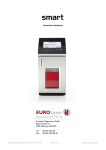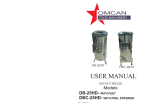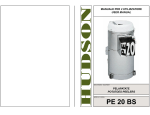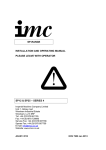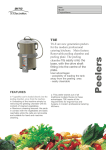Download Schwinn Sting-Ray Bicycles Owner's Manual
Transcript
QUALITY FEATURES RIDES BETTER — LAST LONGER — COSTS LESS IN THE LONG RUN! OWNER’S MANUAL Schwinn Frame Electronically Forged Strongest Frame Built Schwinn Frame Head Extra Strength Only on Schwinn Rear Fork Ends Stronger, Welded on. 4-Coat Finish Lustrous Baked-On Colors That Stay On! STING-RAY BICYCLES Schwinn Tubular Rims Double Thickness— Far Stronger Built-in Kicktand Welded On SINGLE-SPEED MODELS WITH COASTER BRAKE ● KRATE STING-RAY® ● DELUXE STING-RAY® ● STING-RAY® Schwinn Quality EQUIPMENT—Compare t h e hubs, pedals, handlebars and grips, saddle, tires and tubes, gears and controls—all fine quality, to measure up to Schwinn's standards of performance and durability. For suggested accessories for your new Schwinn bicycle see page 18 Copyright © 1998 Schwinn Bicycle company, All Rights Reserved Schwinn Publication Number 9494 PRICE FULLY ASSEMBLED Then In 1963 Schwinn introduced the Stingray, a new kind of bicycle that had kids across America drooling to the point of dehydration. Drawing inspiration from popular muscle cars of the day, Schwinn engineers designed the Stingray with a sleek, low-slung cantilever frame, meaty rear tire, high-rise handlebars and bucket style banana seat. By 1968, the Stingray had evolved into an even more stylish machine called the Krate. Krates had a chopper-esque 16” front wheel, a springer suspension fork, floating seat struts and shorty chrome fenders. The ‘68 Krate was a five speed, but by 1971 Schwinn was offering Krates in a single speed version. It wasn’t long before Orange Krates, Apple Krates, Lemon Peelers, Pea Pickers and Gray Ghosts were criss-crossing neighborhoods from coast to coast. Schwinn would sell over 1 million Stingrays and Krates, bikes which eventually gave birth to the sport of BMX and became an important slice of Americana along the way. Now Your new Krate is a reissue of the original 1972 single speed. Some details were updated to meet current standards or changed slightly to allow for current manufacturing processes, but the bike is as true to Schwinn’s original design as possible. The frame is internally lugged, TIG-welded, ground and hand polished to replicate Schwinn’s original “electro-forged” frame building process. Frame geometry is exact to 1972 specifications. The ‘72 Krate reissue is available in red (Apple Krate) and orange (Orange Krate). Tomorrow Your new Krate uses Schwinn’s original serial number system, including codes for both the year and month the bike was produced. A bike produced in January of 72 might have the serial number AA00001; a bike produced in February of that same year would be BA00001, and so on. Take care of your Krate and it just might be worth something some day. But at the very least it will provide you with enjoyment well into the future—regardless of whether you ride it or just hang it on the wall.



